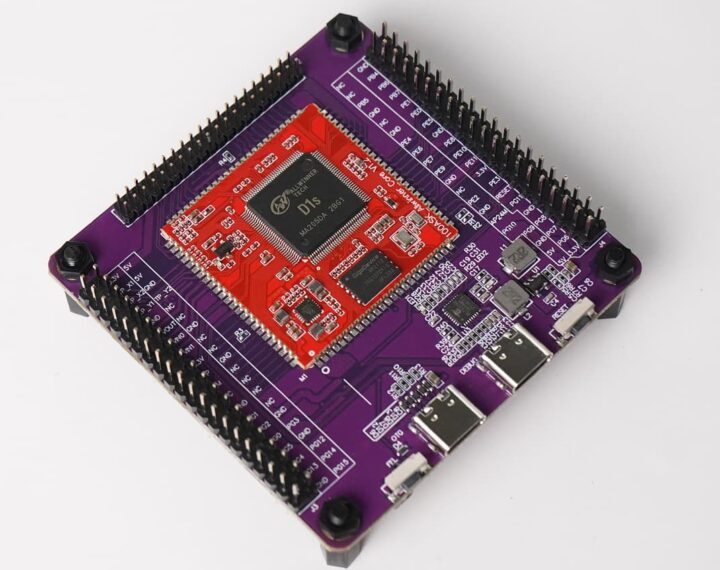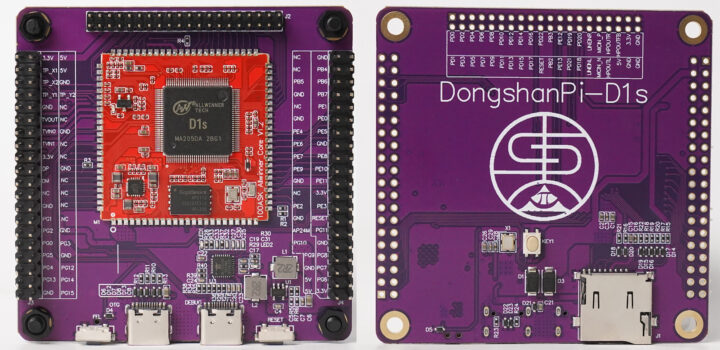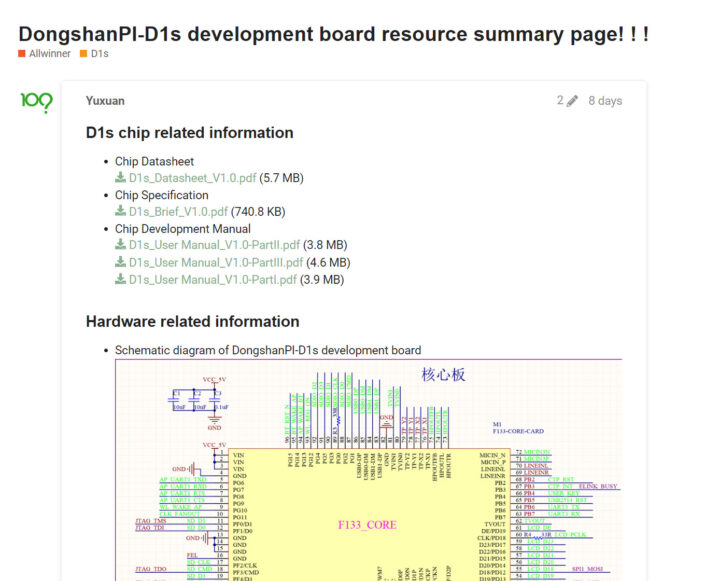The DongshanPI-D1s development board is comprised of a soldered-on Allwinner D1s RISC-V system-on-module board (SoM) and a carrier board with two 40-pin headers and a 2.0mm dedicated header. This development board is specifically designed to teach programming with a focus on the RISC-V architecture.
The development board was designed by 100ask. They previously designed the Dongshan NeZha STU a development board based on the Allwinner D1. The main difference between the two is that 100ask did not include the Ethernet and HDMI interfaces on the DongshanPI-D1s board. The pinout of the headers is also slightly different because they opted to make the headers compatible with the widely used 40-pin GPIO from Raspberry Pi single board computers.

DongshanPI-D1s preliminary specifications:
- D1s Core Lite
- SoC – Allwinner D1s single-core XuanTie C906 64-bit RISC-V processor @ 1.0 GHz with with 32 KB I-cache + 32 KB D-cache
- Memory – 64 MB DDR2 (SIP)
- Debugging – USB-C port for built-in JTAG+UART debugger based on BL702 RISC-V MCU
- Storage – 16MB SPI NOR flash (GD25Q127C)
- Video decoding – H.265/H.264 up to 1080p @ 60fps and MPEG-1/2/4, JPEG, VC1 up to 1080p @ 60fps
- Video encoding – JPEG/MJPEG up to 1080p @ 60fps
- Carrier board
- Storage – MicroSD Card slot
- USB
- 1x USB Type-C OTG Port (FlashSystemPort)
- 1x USB Type-C port for debugging through the BL702 for UART debug and CKlink port
- Expansion
- J2 – 40-pin 2.0mm pitch header for display interfaces (RGB, MIPI) and audio for example headphones
- J3 – 40-pin 2.54mm pitch Raspberry Pi compatible header with power signals, GPIO, I2C, SPI, TP_X/Y, TV IN/OUT, USB
- J4 – 40-pin 2.54mm pitch Raspberry Pi compatible header with power signals, GPIO, UART, I2C
- Misc – RESET and FEL buttons
- Power Supply – 5V via USB-C OTG port or debug port.
- Dimensions – 70x70mm
Note: Those are the specifications for the V1.0 version of the board, and the V1.1 variant may not use a system-on-module, and instead the company would solder the CPU, memory, and storage directly on the main board.

The board is equipped with the RISC-V debugger to perform chip-level debugging and development. The board is mostly positioned for students who like to study low-level programming. T-head and Allwinner will support Tina Linux (OpenWrt + Linux 4.9) SDK for the board. In addition, 100ask will also provide Linux and RT-Thread Smart IoT RTOS support for this board. Motivated developers can also port FreeRTOS, T-Head’s RT-Thread, Allwinner’s MELIS, or even the bare metal Xfel Rust project to the board with the resources will discuss below.

100ask provides developers with the schematic diagram of the development board, the datasheet, a product brief, and other information for the Allwinner D1s SoC, as well as information about the core T-HEAD C906. You’ll find the documentation and resource information on a summary page.
The DongshanPI-D1s board is available on Aliexpress for $17.78 plus shipping. 100ask is also crowdsourcing software development and documentation for developers in mainland China and around the world although the information is only available in Chinese. Some functions will be sponsored by 100ask with free development boards and monetary compensation. The company welcomes any software be it a new operating system, a complete example of a Linux sensor module, or a new bare metal demo.

Leo became a part-time writer for CNX Software in 2022 and works as a software engineer in an embedded software company in China. He’s been passionate about embedded development and the Internet of Things for many years, with extensive industry experience, and a new and unique vision!
Support CNX Software! Donate via cryptocurrencies, become a Patron on Patreon, or purchase goods on Amazon or Aliexpress. We also use affiliate links in articles to earn commissions if you make a purchase after clicking on those links.





Considering high shipping cost, D1s SoC and only 64GB memory, MangoPi MQ-Pro D1, for almost the same price is far better choice.(https://www.aliexpress.com/item/1005004157984532.html
There’s a few different Allwinner D1 C906 boards around with different cons and pros on specs and prices. For instance, the DongshanPi has more pins than the MangoPi and official JTAG though it has a slightly worse kernel version currently while the Lichee has an audio port but less RAM…
Basically, different customers have different needs so $5-10 differences don’t necessarily play that much of factor when deciding on a D1 C906 board.
Thank you for your detailed explanation of each D1 development board. Regarding DongshanPI, you don’t have to worry about the price. You can get their official support, including development boards or monetary compensation. For specific requirements, see the last paragraph of the article.
Seeing J1…4 I thought at first of JTAG debug connectors, but this D1 is all about the PI GPIO. This is going to freak out people’s parents that simple agronomy automation and refitting a 20-arm crab tractor are the easiest things to match…unless I missed using the MIPI for microscope cameras as well as a display. Looking forward to what documentation comes out (2 hour super fluffy pancake maker and queue, power glitching RTOS fun, etc.)
Reads like GPT3
The board you posted link to has a price of US $30.32 + shipping US $7.63. 40 USD for a board that copies the Raspberry PI /2 Zero and cost 10-15 USD seems quite expensive ? By the way, lately the Chinese seems to increased quite the prices of their products, Even for the shipping use all kind of crook practices to increase the price.
DongshanPI is $22.14 + shipping $15.65, so I think my comment stands.
DongshanPi is “specifically designed to teach programming with a focus on the RISC-V architecture”, so the price isn’t actually the issue, more serious issue is that the software support is quite limited and relies mostly on third party support (this is true for all D1 based boards).
why not lipo on board? like orangecrab
Guessing that’s a typo as, for all their mistakes, I don’t know of the Foundation suing anyong over the 40 pin connector.
Oops my bad during editing :).
If only we could be mroe like me. I nevr make miskaes!!
HA!
Thank you, thank you! I’ll see myself out….